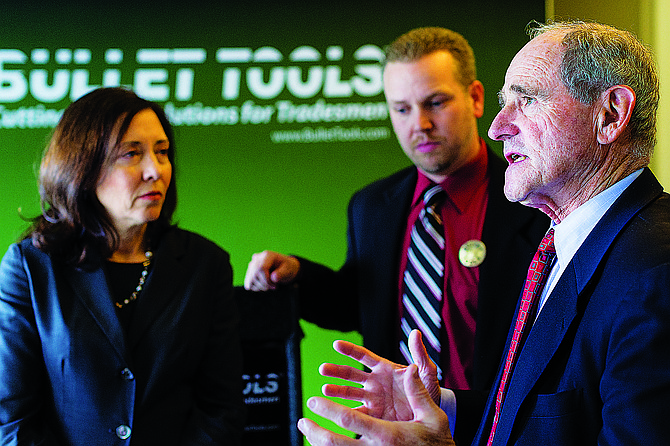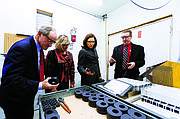Business Q&A with Sen. Jim Risch

U.S. Sen. Jim Risch, right, discusses the level of cooperation between political parties in regard to growing small business as U.S. Sen. Maria Cantwell, far left, and Ben Toews, president of Bullet Tools listen.
James Risch has been in public service for more than 50 years. He's been a state legislator, lieutenant governor, governor and, since 2009, a U.S. senator representing Idaho.
But Risch is also a businessman at heart, from his days in a law firm to running a large and successful family ranch.
The Business Journal of North Idaho recently reached out to Sen. Risch to get some of his insights into what's happening in the business world.
BJNI: In your role with the Senate Committee on Small Business and Entrepreneurship, what's your assessment of the state of small business in Idaho as we emerge from the impacts of COVID-19? Is the field ripe for prosperity, or do you see landmines just below the surface?
RISCH: There is much to be optimistic about. Immediately preceding the pandemic, the United States was in the middle of the longest economic expansion in our history. During my time as Chairman of the Small Business Committee, I worked extensively with the previous administration to pass pro-growth policies that resulted in an economic boom with record low unemployment and consistent job and wage growth at all income levels.
The pandemic presented Idaho’s small business owners with challenges not seen in our lifetime and temporarily interrupted that success, but we are on the way to recovery. As we start to turn a corner on COVID, Idaho is well-positioned to continue to be the best place in the country to open a small business. Thanks to the conservative policies and regulatory cuts by Governor Little and the Legislature, we have the strongest economy in the nation.
BJNI: The most common complaint we hear from employers is that they can't fill existing positions. These range from dishwasher to senior manager. Are there things you or the committee can do to help states like Idaho solve this critical problem?
RISCH: I have heard this from every corner of Idaho. There are just not enough workers to fill open jobs. This problem is symptomatic of the current administration’s one-size-fits-all approach to governing. The $300 per week in federal unemployment coupled with existing state unemployment benefits provided many people with higher compensation than they received while working. We need to encourage folks to be working. Every American deserves to experience the dignity of having a job.
BJNI: Gov. Little is nixing the $300/week unemployment bump in hopes of encouraging able people to get back in the workforce. That money comes from the federal government. What's your reaction to the governor's decision?
RISCH: Governor Little made the right decision. COVID-19 vaccines are available across the state and restrictions have been lifted to a large degree. The state is poised to bounce back and has already made great strides in that direction. Solutions that help transition people back into the workforce are fundamental to getting Idaho’s economy back to full strength.
BJNI: In an editorial board meeting with The Press last fall, you said whoever gets elected president would likely benefit from a booming economy as COVID-19 impact lessens. Is that happening now, and how do you view the economic outlook with Joe Biden occupying the White House?
RISCH: The previous administration’s pro-growth policies laid a strong economic foundation so that when the pandemic was over, we could get back to the historic success we enjoyed immediately beforehand. However, I never anticipated any governing body could spend at the pace the current administration is proposing.
We are now $28 trillion in debt, and with the current administration’s rate of spending, our deficit is on pace to exceed the size of the entire U.S. economy in just 10 years. What’s more, this spending is creating a rise of inflation that will hit low-income Americans, rural residents and seniors the hardest.
BJNI: Trying not to open a bottomless can of worms, but with housing costs skyrocketing, gas prices on the rise again, grocery costs ever increasing, should the federal government raise the minimum wage? If not, what are the better solutions?
RISCH: The current administration is printing hundreds of billions in new spending, and the price of goods and services is skyrocketing. The Consumer Price Index jumped 4.2 percent last year, the fastest hike since the 2008 financial crisis, and housing costs in Idaho climbed 15.4 percent, the largest increase in the country. While increasing the minimum wage may appear to be the best solution to this problem, it actually makes it worse. The solution is much simpler.
Small businesses operate on very tight profit margins. If forced to increase labor costs, those costs will fall primarily on the customer and potentially price the business out of the community. When this happens, it can pave the way for larger companies who can afford the additional expense to consume the market.
If the goal is to create a small business and worker-friendly climate, the best thing to do is let the market determine the cost of labor. As we are seeing now with the shortage of labor, employers are increasing pay to attract workers. When we allow capitalism to flourish, we all flourish.
BJNI: Any cool programs or plans on the horizon at the federal level that local employers (and employees) can look forward to? Or are there resources, like Small Business Administration, that aren't being tapped enough?
RISCH: A critical Small Business Administration program that I strongly advocate for is the Small Business Innovation and Research (SBIR) program. The SBIR program provides research and development grants to small businesses. Idaho has had a few success stories from the program, such as American Semiconductor in Boise. However, Idaho is considered “underserved” by the program, meaning it does not participate much compared to other states. If you have an idea and you want to grow your business, I encourage you to contact my office and apply for these grants.











